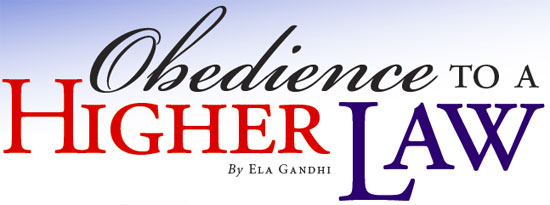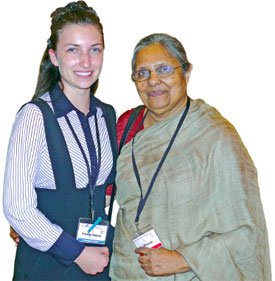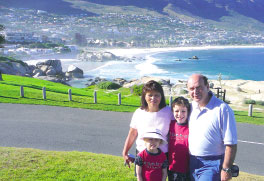Obedience to a Higher Law
Ela Gandhi July/August 2007
Over the years in our struggle for liberation in South Africa we learned one very important lesson, and that is that when people of different races and cultures or ethnic backgrounds are kept apart and there is no communication or interaction among them, it results in:
1. prejudices against one another based on myths that develop about the other,
2. suspicion of one another because there is no knowledge of what the other feels and thinks, and
3. fear of one another because of internalized anxieties.
All these manifested themselves in our divided society in South Africa. The lesson, therefore, is that we need to open the doors of communication and interaction among people. This then leads us to the need for interfaith education and understanding.

|
| Ela Gandhi (right) and Kristina Malorek, an IRLA volunteer from Australia. |
Through this interaction and knowledge he developed respect and understanding for each of the faiths. He saw the similarities and the differences. But he was able to accept and embrace all of the beliefs and to respect them.
Gandhi proclaimed that religion and political activism were two sides of the same coin. He said, "Mine is not a religion of the Prison-house. It has room for the least among God's creation. But it is proof against insolence, pride of race, religion, or color."
Gandhi's strong patriotism had roots in his strong religious beliefs. Our religions teach us to be kind, gentle, truthful, faithful, compassionate, and so on. Religion is meant to draw on all that is good in human beings. Father Thomas Merton wrote in his book on Gandhi and nonviolence: "Call these values or what you will, 'natural religion' or 'natural law.' Christianity admits their existence at least as preambles to faith and grace, if not sometimes vastly more (Romans 2:14, 15; Acts 17: 22-31). These values are universal."

It is because of this belief in the good in all religions that Gandhi was able to embrace all religions and yet be a Hindu.
In daily life we are called upon to make choices.
There is no doubt that to pursue a good life, to observe the Ten Commandments or the Word of the Lord as seen by each faith, every day of our life, there will certainly be a need for self-control; there would certainly be a need for placing your own needs last while upholding the needs of others.
So it is not easy to be good and to do good. Giving to others means less for you—in terms of time, money, and personal fatigue. So, clearly the driving force behind the choices—especially the hard choices—is the faith and belief.

|
| Liberty Editor Lincoln Steed and his wife Rosa Delia, children Kristen(5) and Christopher (9) at one of many stuning beaches south of Cape Town |
Religion that brings with it spirituality, which is the force that drives people to do things or not do certain things, is no doubt important in bringing about peace, in creating a conscience in people which in turn should deter them from being unjust, offensive, selfish, narrow, and sectarian.
But it is also important to unite as human beings to deal with issues of poverty and deprivation, to ensure that no one is marginalized, and that the rights of individuals remain a basic human right.
During the years of the struggle against apartheid, South Africa witnessed huge demonstrations and marches led by leaders of the various faiths. The young Christians came together and drew up the Kairos document interpreting the Scriptures to reflect its values of liberation and equality. This togetherness was further entrenched by us in 1992 when we drew up a charter of religious rights and responsibilities. This initiative was further developed and entrenched in the new dispensation. We have a number of instruments to encourage and ensure the importance and freedom of all religions. We have religious rights and freedom entrenched in our constitution.
However, we must remember that while this is one perspective of history there was another perspective that gave credence to apartheid that continues to this day to oppose the interfaith concept and advocates the existence of only one true belief. It is not any one religion that is guilty of this; all religions have the advocates of tolerance, respect, and religious liberty, and alongside also have the fundamentalist cult furthering division hatred and even violence.
In the present time we need to each examine within ourselves as to who is the stronger of the two, for it is in the strengthening of the advocates of religious liberty that we are able to strengthen the fabric of our society and ensure a peaceful society.
Gandhi said: "What chiefly distinguishes man from the beast is that man from his age of discretion begins to practice a life of continual self-restraint." An important element of Gandhian belief is the concept of self-control, or self-restraint. Gandhi expressed concern about the issues of rights: whether these were human rights or any other rights. He felt that an important objective is to build responsibility that goes hand in hand with self-control. He said that if we build a culture of responsibility, rights would naturally follow. He said: "The true source of rights is duty. If we all discharge our duties, rights will not be far to seek. If leaving duties unperformed we run after rights, they escape us like a will-o'-the-wisp. The more we pursue them, the farther they fly."
Perhaps as we discuss the various United Nations charters, we need to once again consider whether the charters are in fact working, and whether there is not a need to look at duties together with rights. There is undoubtedly a need to rebuild a culture of responsibility in people, in groups, and communities. All around we see the wastage, the unconcern, negativity, criticisms, and anger.
Gandhi said: "Real disarmament cannot come unless the nations of the world cease to exploit one another. The very first step in nonviolence is that we cultivate in our daily life, as between ourselves, truthfulness, humility, tolerance, loving kindness."
Nonviolence is the law of our species as violence is the law of the brute. The spirit lies dormant in the brute, and it knows no law but that of physical might. The dignity of man requires obedience to a higher law, to the strength of the spirit
Ela Gandhi, a granddaughter of Mahatma Gandhi, heads up the Gandhi Foundation. This article is excerpted from the speech she gave at the IRLA Conference in Cape Town, South Africa.